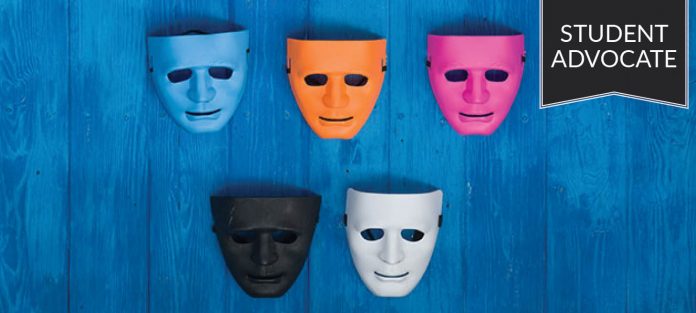
The issue
Many college students experience the impostor phenomenon—a feeling that they got into this university or program through luck rather than ability and effort. Certain student populations are especially vulnerable: first-generation students, ethnic and racial minorities, women in male-dominated fields, and students from high-achieving families.
Why it matters
Feeling like an impostor undermines the development of resilience. It’s a barrier to integrating socially and academically with the campus community (a key to student success). “Impostor” students may see challenges as evidence that they don’t belong in college rather than as opportunities for growth.
How to help students integrate with the campus community
Help grow students’ sense of belonging
Incorporate “social-belonging” messaging into communications. “The primary message is a message of growth—that over time, everyone comes to feel at home,” writes Dr. Greg Walton, associate professor of psychology at Stanford University.
Connect students with similar faculty members
For example, create a way for first-generation faculty to share their stories and show that they’re available to meet with first-generation and low-income students. “The UVA web resource [below] is a great example of something that’s really easy,” says Katharine Meyer, a doctoral researcher in education policy at the University of Virginia. “The stories communicate that transitioning to college is difficult, stress and struggle are common, and that, eventually, students will connect and persevere.”
First-generation college graduates on faculty
Proactively bring students to office hours
Office hours can be intimidating. Bringing people there “communicates to students, and especially to first-generation students, that office hour attendance is welcome and something everyone does,” says Meyer.
Normalize and reframe impostor feelings
Acknowledge the impostor experience and demonstrate how to reframe these feelings and accept praise. Incorporate this strategy into RA training. “You have to practice reframing the thoughts in your head,” says Dr. Valerie Young, author of The Secret Thoughts of Successful Women: Why Capable People Suffer from the Impostor Syndrome and How to Thrive in Spite of It (Crown Business, 2011).
Teacher: “Your feelings are common. You deserve to be here. In fact, I recommend that you take a more advanced class.”
Student: “Whoa, but I don’t know what I’m doing.”
Teacher: “You’re ready. Think about how much you’ll learn and what a great opportunity this is to challenge yourself.”
Recognize the value of failure
Emphasize that asking for support and experiencing failure help move us toward success.
“It’s OK to raise your hand and ask the question or say, ‘I’m not following; please explain again.’”
The Secret Thoughts of Successful Women: Why Capable People Suffer from the Impostor Syndrome and How to Thrive in Spite of It: Valerie Young (Crown Business, 2011)
Resources for low-income students: Let’s Get Ready
Princeton professor’s CV of failures: Princeton University [pdf]
Keith Anderson, PhD, FACHA, psychologist/outreach coordinator, Rensselaer Polytechnic Institute, New York.
Amy Baldwin, EdD, director of University College at the University of Central Arkansas; author of The First-Generation College Experience (Prentice Hall, 2011).
Adrian K. Haugabrook, EdD, vice president for student success and engagement, Wheelock College, Massachusetts.
Luoluo Hong, PhD, vice president for student affairs and enrollment management, San Francisco State University, California.
Katharine Meyer, PhD candidate, Curry School of Education, University of Virginia.
Valerie Young, EdD, speaker, author of The Secret Thoughts of Successful Women: Why Capable People Suffer from the Impostor Syndrome and How to Thrive in Spite of It (Crown Business, 2011).
Baumeister, R. F., Bratslavsky, E., Finkenhauer, C., & Vohs, K. D. (2001). Bad is stronger than good. Review of General Psychology, 5(4), 323–370. Retrieved from https://carlsonschool.umn.edu/file/49901/download?token=GoY7afXa
Clance, P. R., & Imes, S. (1978). The impostor phenomenon in high achieving women: Dynamics and therapeutic intervention. Psychotherapy Theory, Research, and Practice, 15(3), 241–247. Retrieved from http://www.paulineroseclance.com/pdf/ip_high_achieving_women.pdf
Cokley, K., McClain, S., Enciso, A., & Martinez, M. (2013). An examination of the impact of minority status stress and impostor feelings on the mental health of diverse ethnic minority college students. Journal of Multicultural Counseling and Development, 41(2), 82–95.
Guardian Staff. (2016, April 29). CV of failures: Princeton professor publishes résumé of his career lows. Guardian. Retrieved from http://www.theguardian.com/education/2016/apr/30/cv-of-failures-princeton-professor-publishes-resume-of-his-career-lows
Gravois, J. (2007, November 9). You’re not fooling anyone. Chronicle of Higher Education. Retrieved from http://chronicle.com/article/Youre-Not-Fooling-Anyone/28069/
Ito, T. A., Larsen, J. T., Smith, K. N., & Cacioppo, J. T. (1998). Negative information weighs more heavily on the brain: The negativity bias in evaluative categorizations. Journal of Personality and Social Psychology, 75(4), 887–900.
Matthews, G. (1984). The impostor phenomenon: Attributions for success and failure. In G. Matthews (Chair), Impostor phenomenon: Research, assessment, and treatment issues. Symposium conducted at the 92nd Annual Convention of the American Psychological Association, Toronto, Canada.
Rose, A. J., Carlson, W., & Waller, E. M. (2007). Prospective associations of co-rumination with friendship and emotional adjustment: Considering the socioemotional trade-offs of co-rumination. Developmental Psychology, 43(4), 1019–1031.
Sakulku, J., & Alexander, J. (2011). The impostor phenomenon. International Journal of Behavioral Science, 6(1), 73–92. Retrieved from http://bsris.swu.ac.th/journal/i6/6-6_Jaruwan_73-92.pdf
CampusWell survey, June 2016.
Tugend, A. (2012, March 23). Praise is fleeting, but brickbats we recall. New York Times. Retrieved from http://www.nytimes.com/2012/03/24/your-money/why-people-remember-negative-events-more-than-positive-ones.html?_r=0



























